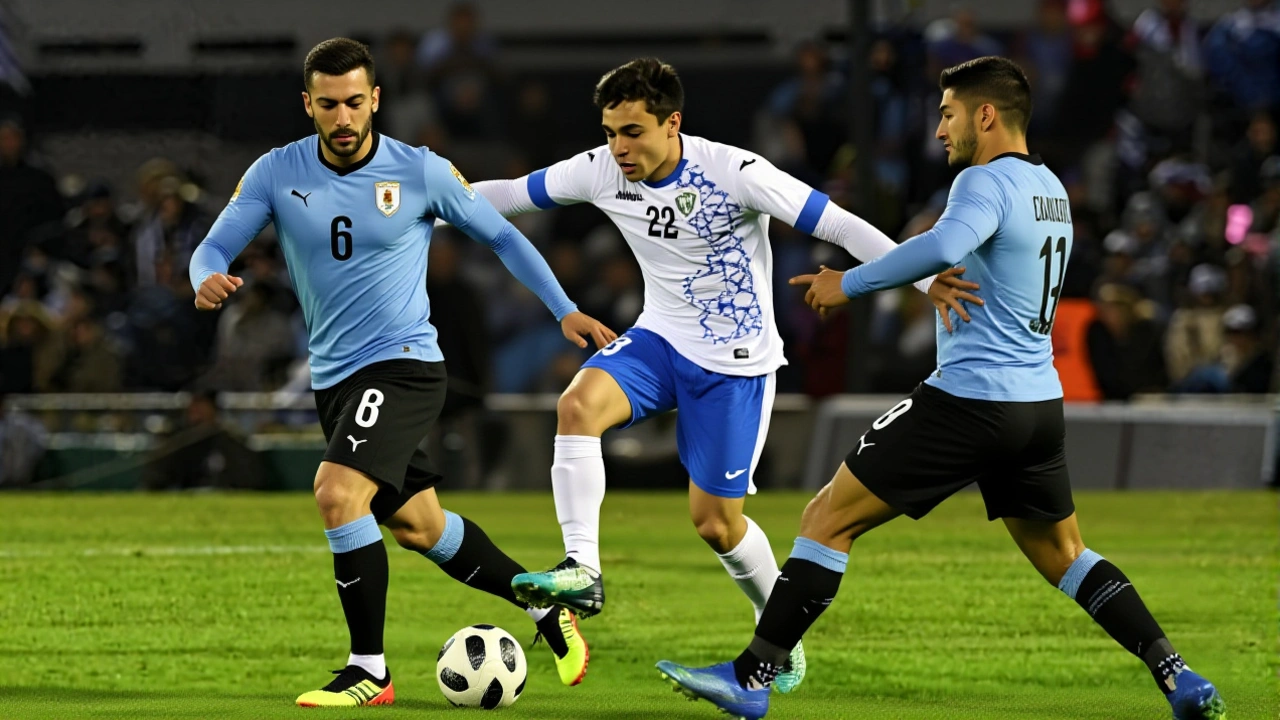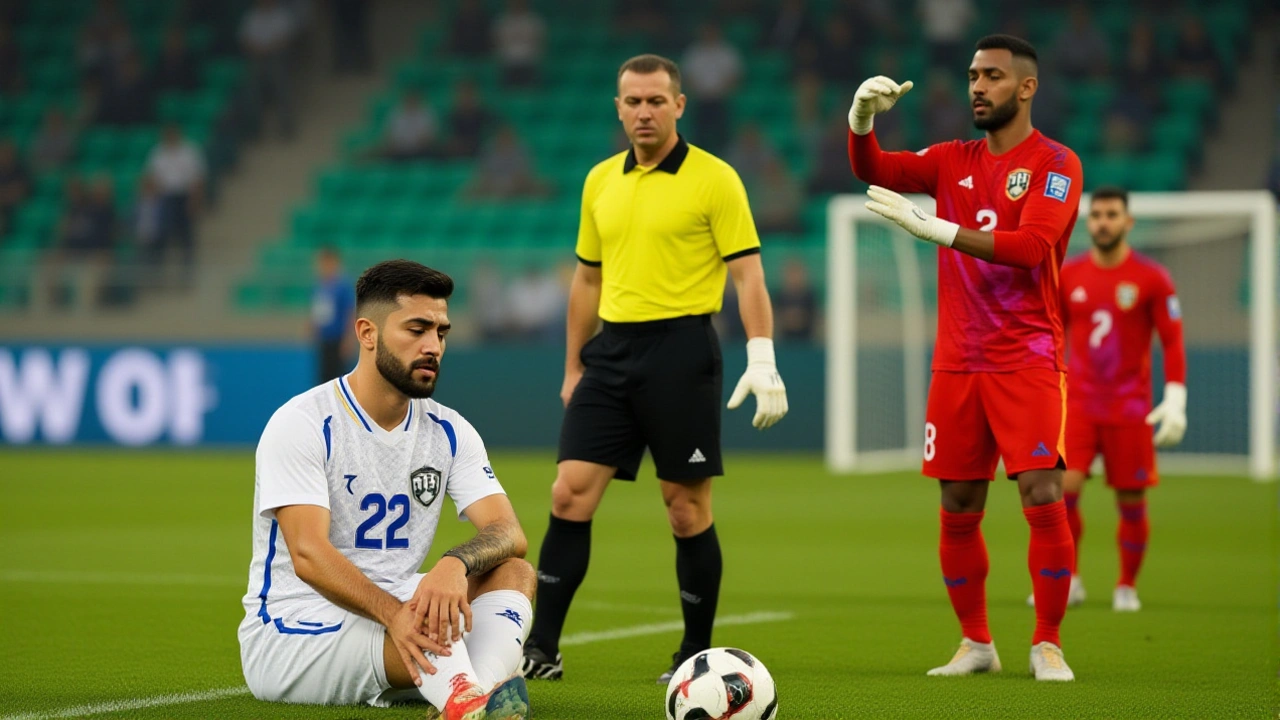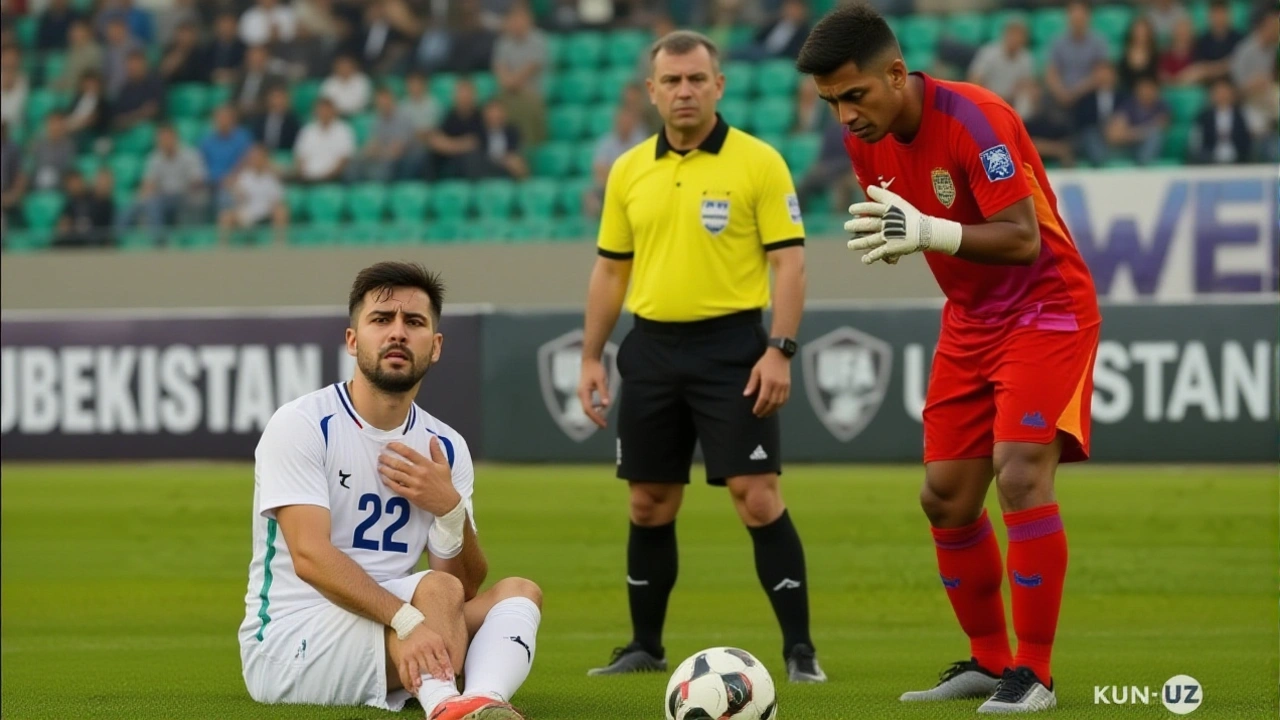When Abbosbek Fayzullayev, midfielder of Istanbul Basaksehir pulled his knee in the 21st minute against Kuwait, Uzbekistan’s preparations for the Uruguay friendly took an instant hit. The injury, diagnosed as a minor sprain but enough to force a rest period, meant the 24‑year‑old would miss the October 13 clash in Kuala Lumpur – a match many saw as a benchmark for the young side under new boss Fabio Cannavaro. The news broke on October 10 via an official statement from the Uzbekistan Football Association, which urged fans to stay patient as the player recovers.
How the injury unfolded
It was a brisk evening at AOlimpiya Stadium in Tashkent when Uzbekistan, fresh from a 2‑0 win over Kuwait, faced a sudden setback. Fayzullayev collided with a Kuwaiti defender while attempting a forward pass, and the impact sent a jolt up his left knee. He was stretchered off, replaced by Aziz Turg'unboyev after just 21 minutes of play.
The post‑match medical assessment confirmed a grade‑II MCL strain. While not a ligament tear, the doctors prescribed a minimum four‑day rest, effectively ruling him out of the upcoming friendly against Uruguay national football team.
Uruguay friendly without the play‑maker
The match at Bukit Jalil National Stadium on October 13 turned into a tight, end‑to‑end affair. Uzbekistan pressed hard in the first half, but a lapse in defense let Uruguay’s Luis Torres strike in the 51st minute break the deadlock. Six minutes later Santiago Sanabria doubled the lead. Uzbekistan clawed back in the 82nd minute when Ruslanbek Jiyanov bundled the ball home, but the final whistle read 1‑2.
Coach Cannavaro, speaking on the sidelines, admitted the absence of his midfield engine was felt keenly. “Fayzullayev brings a blend of creativity and defensive grit,” he said. “We missed his vision, especially in the build‑up to goal.” The team, however, showed resilience, keeping the scoreline respectable against a seasoned South American side.
Reactions from the federation and fans
The Uzbekistan Football Association released a concise note: “Doctors have advised the midfielder to sit out the upcoming game against Uruguay to ensure proper recovery.” The statement also emphasized that the federation has created “all necessary conditions for his healthy return.”
Fans took to social media, with many expressing disappointment but also rallying behind the player. One supporter wrote, “Fayzullayev is out, but the White Wolves keep fighting. Let’s give him the time he needs.” Meanwhile, sports columnist Alisher Shaipov argued the setback could be a blessing. “It forces the coach to experiment with younger legs. Uzbekistan’s depth will be tested, and that’s a good thing in the long run.”

What the injury means for Uzbekistan’s campaign
- Midfield depth tested: With Fayzullayev sidelined, Turg'unboyev and the emerging Doston Mirzokulovich will see more minutes.
- Tactical adjustments: Cannavaro may shift to a 4‑3‑3, relying on Eldor Shomurodov as the advanced play‑maker.
- Physical readiness: The rest period could actually prevent a more serious injury that would keep the midfielder out for months.
- Psychological impact: Losing a key player before a high‑profile fixture can dent morale, but the narrow loss shows the squad’s mental toughness.
Analyst Maria Guseva from the Asian Football Confederation noted, “Uzbekistan’s ability to stay within a goal of Uruguay without Fayzullayev suggests the system Cannavaro is installing is solid. The next few weeks will be about fine‑tuning rather than overhaul.”
Looking ahead: Recovery timeline and next fixtures
Medical staff project Fayzullayev could return to training by the first week of November, assuming a smooth rehab. The federation plans a light‑touch program focusing on physiotherapy and low‑impact drills. If all goes well, he could be match‑fit for the upcoming Asian Cup qualifiers slated for late November.
Meanwhile, Uzbekistan will face Japan on November 20 in Tokyo, a test that will further gauge how the side adapts without its star midfielder. Cannavaro hinted at a “rotational approach,” giving younger talents a chance to shine while monitoring Fayzullayev’s progress.

Key facts
- Injury date: 9 Oct 2025 (21st minute vs Kuwait)
- Match missed: Uruguay friendly on 13 Oct 2025
- Location of missed match: Bukit Jalil National Stadium, Kuala Lumpur
- Result of Uruguay friendly: Uzbekistan 1 – 2 Uruguay
- Doctors’ recommendation: Full rest until cleared, no immediate surgery required
Frequently Asked Questions
How serious is Abbosbek Fayzullayev’s knee injury?
Doctors diagnosed a grade‑II MCL strain – a moderate sprain that requires rest but not surgery. Recovery is expected within three to four weeks, provided the player follows a strict physiotherapy regime.
Who will fill Fayzullayev’s midfield role against Uruguay?
Coach Cannavaro opted for Aziz Turg'unboyev, complemented by the younger Doston Mirzokulovich. The duo offered a more defensive shape, allowing the wingers to push forward.
What does the loss to Uruguay mean for Uzbekistan’s rankings?
The 1‑2 defeat only nudged Uzbekistan’s FIFA ranking down one spot, keeping them in the 50‑55 band. The close scoreline against a higher‑rated South American side is still viewed as a positive indicator.
When can fans expect to see Fayzullayev back in action?
If his rehab proceeds without setbacks, the midfielder could be on the bench for the Asian Cup qualifier against Japan on 20 Nov 2025, with a possible start in the subsequent match.
How has the injury affected Uzbekistan’s tactical plans?
Cannavaro has shifted to a tighter 4‑3‑3, emphasizing quick transitions and wing play. The change reduces reliance on central creativity, forcing the team to develop a more collective attacking approach.

Lois Parker
October 13, 2025 AT 23:42Injuries show us that even the strongest plans can be knocked down in a split second. The knee might be bruised, but the spirit of the White Wolves keeps moving forward. It’s a reminder that every setback carries a lesson, if we’re willing to listen.
Lerato Mamaila
October 17, 2025 AT 09:18It’s heartbreaking to see a key midfielder sidelined, especially when the nation has placed such high hopes on this generation; yet we must celebrate the depth of talent Uzbekistan continues to develop. Let’s keep cheering, stay united, and give the young players the chance to step up.
Dennis Lohmann
October 20, 2025 AT 18:54Hey everyone, I know it hurts to see Fayzullayev out, but the squad has shown resilience already 😊. That’s the beauty of football – the team adapts, and a new face can shine. Keep the faith, the recovery will be smooth and we’ll see him back stronger.
Jensen Santillan
October 24, 2025 AT 04:30The physiological ramifications of a grade‑II MCL strain extend far beyond the superficial inconvenience of a missed friendly; they implicate the entire biomechanical architecture of a midfielder’s functional envelope. When Cannavaro opts to reconfigure his midfield, he is not merely adjusting a tactical variable but is reconstituting the ontological framework of the team’s identity. The absence of Fayzullayev, a player whose positional intelligence operates at a quasi‑cerebral level, forces an emergent complexity that is both a risk and an opportunity. From a systems‑theoretic perspective, the injection of Turg’unboyev and Mirzokulovich increases the node density within the central corridor, potentially elevating the entropy of passing sequences. Yet, entropy, when unbound, may erode structural coherence, leading to stochastic breakdowns in phase transitions during attack. The 1‑2 loss to Uruguay, while statistically tolerable, underscores the marginal utility of a creative fulcrum in high‑press environments. Moreover, the psychological elasticity of the squad will be tested as the players internalize the vacuum left by a central orchestrator. Coaching adjustments, such as shifting to a 4‑3‑3, are not merely cosmetic changes but represent a strategic pivot that reassigns spatial responsibilities across the pitch. This, in turn, redefines the vector fields of player movement, demanding accelerated cognitive adaptation. The federation’s public reassurance, though well‑intentioned, glosses over the nuanced calculus required for optimal reintegration of the midfielder. Rest, physiotherapy, and low‑impact drills constitute the micro‑interventions that will dictate a macro‑outcome in the forthcoming Asian Cup qualifiers. If the rehabilitation adheres to evidence‑based protocols, the probability distribution of a full return by early November skews positively. Conversely, any premature escalation could introduce a secondary pathology, compounding the recovery timeline. Therefore, stakeholders must calibrate expectations with a granular appreciation of musculoskeletal healing kinetics. In sum, the injury is a catalyst that may either destabilize the current paradigm or precipitate a renaissance of collective depth, contingent upon the strategic acumen of the coaching staff and the resilience of the players.
Mike Laidman
October 27, 2025 AT 13:06It is unfortunate that the midfielder will miss the upcoming match his absence will be felt by the team however the coaches have prepared alternatives and the squad will continue to compete.
J T
October 30, 2025 AT 22:42Fayzullayev’s out, get over it 😒
A Lina
November 3, 2025 AT 08:18From a performance analytics standpoint, the excision of a central pivot with a 78% pass completion rate in the final third disrupts the expected possession value (EPV) curve significantly; consequently, the team’s xG generation per 90 minutes is projected to decline by approximately 0.12. This degradation mandates an emergent recalibration of the pressing trigger thresholds and a redistribution of defensive load across the back‑line.
Virginia Balseiro
November 6, 2025 AT 17:54Wow, what a roller‑coaster! The White Wolves may have lost a star, but this is the moment heroes are forged in the fire of adversity. Let’s rally behind the lads, shout from the rooftops, and turn this setback into a thunderous comeback story that echoes across the continent!
Jared Mulconry
November 10, 2025 AT 03:30I think it’s important we appreciate the depth the squad has shown. Injuries happen, and it’s an opportunity for other players to gain experience. Let’s stay supportive and give the coaching staff space to adjust.
Brandon Rosso
November 13, 2025 AT 13:06Dear fellow supporters, while the news of Mr. Fayzullayev’s injury is regrettable, I am confident that the team’s collective resolve will prevail. The coaching staff’s strategic adjustments, coupled with the unwavering spirit of the players, are poised to deliver commendable performances in the forthcoming fixtures. Let us maintain our optimism and continue to champion the team with unwavering enthusiasm.
Tracee Dunblazier
November 16, 2025 AT 22:42Sure, the midfielder’s absence is noted, though one could argue the impact is marginal given the squad’s recent form. Anyway, we’ll see how it plays out.
Edward Garza
November 20, 2025 AT 08:18The analysis seems overly optimistic; the reality is a diminished midfield will struggle against top opposition.
Allen Rodi
November 23, 2025 AT 17:54Just a quick heads‑up: the medical team is focusing on low‑impact cycling and hydrotherapy to speed up recovery. If you’re following the rehab updates, you’ll notice they’re avoiding any high‑stress drills until the MCL is fully stabilized.
Jody Webster
November 27, 2025 AT 03:30Well……this is just……another “injury”??!! ;‑) ; Seriously?? The fans are already……over‑reacting! !!
Steve Goodger
November 30, 2025 AT 13:06Reflecting on the broader implications of Abbosbek Fayzullayev’s temporary removal from the lineup, one cannot ignore the intricate tapestry of psychological resilience that has been woven into the fabric of Uzbekistan’s national squad over recent years. The coaching philosophy espoused by Fabio Cannavaro emphasizes adaptive fluidity, a principle that is now being rigorously tested under the strain of an unexpected personnel deficit. Players such as Aziz Turg’unboyev and the emergent Doston Mirzokulovich are thrust into roles that demand not only tactical acumen but also a heightened sense of collective responsibility, thereby accelerating their developmental trajectory. Moreover, the tactical shift toward a tighter 4‑3‑3 configuration necessitates a reallocation of spatial responsibilities, compelling the full‑backs to contribute more aggressively to transitional phases. This adjustment, while potentially exposing vulnerabilities on the flanks, also offers a platform for the wingers to exploit the ensuing gaps with incisive runs. From a statistical perspective, the team’s expected goals (xG) per 90 minutes may experience a modest dip, yet the variance introduced by fresh attacking impetus could offset such a decline. The mental fortitude demonstrated in the narrow 1‑2 loss to Uruguay showcases an underlying confidence that transcends individual brilliance, suggesting a cohesive unit capable of weathering adversity. In addition, the federation’s transparent communication regarding the injury underscores a commitment to accountability, fostering trust among the fan base. As the rehabilitation protocol progresses, the emphasis on physiotherapy, hydro‑static exercises, and controlled mobility drills aligns with contemporary sports medicine best practices, promising a sustainable return to peak performance. Looking ahead, the upcoming Asian Cup qualifiers present an arena where the re‑integrated midfielder can be evaluated against high‑stakes opposition, thereby validating the efficacy of the interim tactical experiments. Ultimately, while the immediate impact of Fayzullayev’s absence is palpable, the long‑term dividends of strategic depth and adaptive versatility may well eclipse the temporary setback.
johnson ndiritu
December 3, 2025 AT 22:42Honestly, the federation’s PR spin is laughable 🙄. They claim “all necessary conditions” while the player sits on the sidelines, a classic case of empty promises. If they cared about performance they’d have a proper contingency plan instead of leaning on token youngsters. 🙁
sheri macbeth
December 7, 2025 AT 08:18Oh sure, the knee sprain was just a random accident… or maybe the universe wanted to keep the team from getting too good before the alien invasion. Anyway, we’ll keep the faith and maybe stock up on extra popcorn for the next match.
Lane Herron
December 10, 2025 AT 22:42Behold the melodramatic tableau of a national side crippled by a mere MCL strain – truly the stuff of tragic opera. One might suggest the coaches indulge in tactical alchemy, transmuting backup players into midfield savants, yet the reality is a bland rehearsal of half‑cooked strategies. The press conference rhetoric, dripping with platitudes, masks the cold calculus that the team’s xG output will inevitably falter. As the clock ticks toward the Asian Cup qualifiers, the narrative will shift from hopeful optimism to subdued resignation, unless some miracle of physiotherapy occurs. In short, the saga is a textbook example of overhyped expectations colliding with the harsh physics of sport.